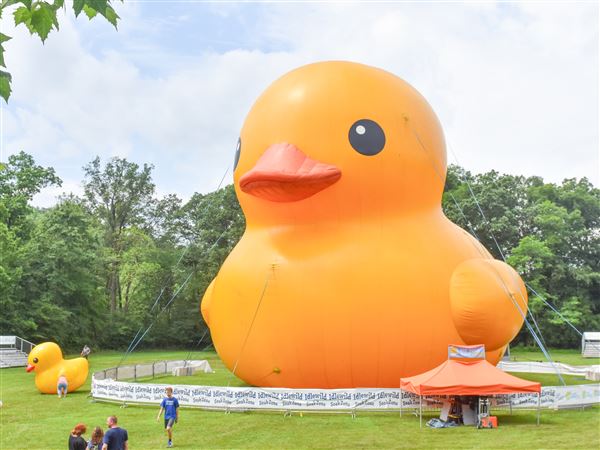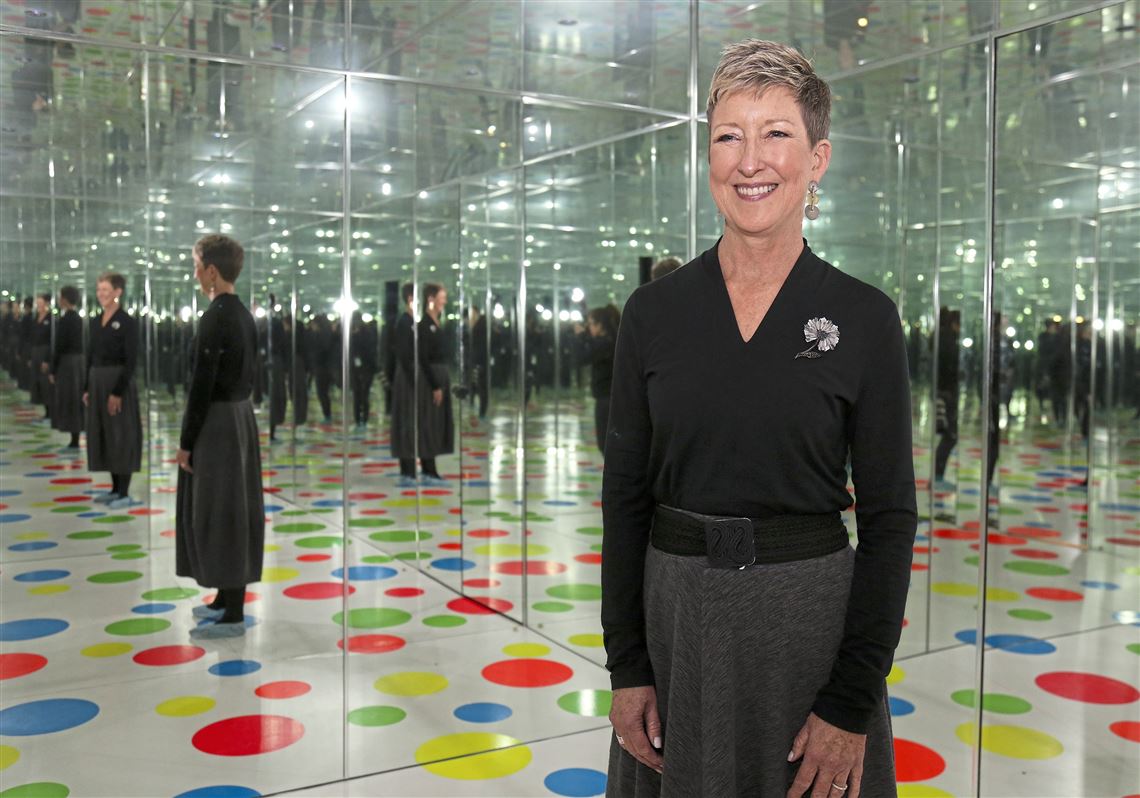Judith Hansen O’Toole was only three months into retirement when she accepted an invitation to become acting director of the Mattress Factory. She was familiar with the storied North Side museum personally and professionally and wanted to help it get through a challenging time.
The museum’s executive director, Michael Olijnyk, was placed on temporary paid leave in September after one current and three former employees filed charges against the museum with the National Labor Relations Board. Museum founder and president Barbara Luderowski, who had been co-director with Mr. Olijnyk, died May 30.
Ms. O’Toole is director emerita of The Westmoreland Museum of American Art in Greensburg, having served as director/CEO for 25 years. Mary Navarro, an experienced arts manager and consultant, also came aboard as special advisor to the museum. She reports directly to Ms. O’Toole.
“Mattress Factory is in a period of crisis that I feel equipped to deal with,” Ms. O’Toole said in an interview. “I’m really grateful to be here because I know I can help. I have the great support of Mary Navarro. The staff has been very welcoming.
“It’s rare that you’re invited to step in by an organization you’ve watched over a 25-year period and feel that you have the needed skill set. Mattress Factory has wonderful people carrying on in all departments. It’s about winning trust along the way.”
Ms. O'Toole was quick to give assurance to the museum’s many fans. “It will survive. It’s been around for 40 years.”
“The task ahead is to develop a strategic plan to move forward. To keep that creative spirit that’s here. What’s the next stage of the organization? How do we bring to it the structure it needs now while preserving that very special vision that Barbara had, that quirky magical spirit.
“I’ve been coming to the Mattress Factory since I moved to this area. During one visit my daughter, Sarah, who was about 8 years old at the time, told Barbara that she liked this museum much better than her mother’s.”
“There’s something wonderful about these artists who have come in and created these spaces. The artist is supreme. I have a deep respect for the artist and what they bring to this organization.”
“It’s very clear what’s needed here, to implement organizational structure and strong policies and to do so sympathetically with regard to the staff.”
Ms. O’Toole will serve initially into January. “The board and I agreed to a three-month period after which I’ll give my assessment of the organization and its needs. Then we can have a conversation about whether they need more input.”
Earning the trust of the staff is a priority, she said, including “trying to boost morale, getting people thinking about the future and keeping programs moving along.
“We also have some work to do to win back the trust of the public and we’re working to resolve the issues that we have.
“We want the programming, exhibitions and visitor experience to be impacted as little as possible. We’re cooperating with the NLRB but keeping that in the back of the house so visitors are not affected.”
At the same time, she said, “we want to be as transparent and open as we can be” and to that end Ms. O'Toole is taking phone calls from the public.
Mattress Factory hired a human resources consultant in the spring to look at gaps in the staff handbook regarding personnel matters. Ms. O’Toole declined to speak about details of the NLRB investigation but said she is talking with each of the persons involved in the complaint. The NLRB is investigating how the museum's managers dealt with employees who complained about the way their allegations of sexual harassment were handled.
“I want to listen to all the stories. It’s the only way to bring structure. Mattress Factory is reeling from Barbara’s illness and death coupled with the potential mishandling of some grievances. The two leading figures who brought structure aren’t here.”
When interviewing for the position, Ms. O’Toole had to address concerns that her experience wasn’t applicable to this very different institution. The Westmoreland has a large collection of historic American artworks and has only recently begun to expand its 20th-century component. Mattress Factory is a contemporary art museum with a small permanent collection and a focus upon art created in residence by national and international artists.
“We are not going to turn this place into a stodgy old museum, which The Westmoreland is not. If you think that, you haven’t been there. Proper ground rules actually set an organization free.”
The Westmoreland opened in 1959 and Ms. O’Toole was the second director, succeeding Paul Chew in 1993.
“I succeeded a well-established founding director who ran the museum a little like a family business,” she said.
The educational team under Mr. Chew went to schools but didn’t bring children to the museum. “Paul Chew didn’t want children in the museum. He thought they would damage the art.”
Ms. O’Toole, who arrived with two young daughters, expanded the education department, offering on-site programming while continuing that established in schools. Mattress Factory also offers extensive youth programming.
Her daughters are biracial and soon became unofficial ambassadors for diversity in a predominantly white community. Both museums consciously consider inclusivity in programming, acquisitions and hiring. The Mattress Factory is the repository for the archives of the late Greer Lankton, a transgender person who was a significant figure in the 1980s East Village art scene.
Ms. O’Toole is married to an artist, sculptor Kevin O'Toole.
“I know the artist’s life. I know their struggles. I have a deep connection to the world of people who make art.”
Early in her tenure at The Westmoreland, she began exhibiting regional contemporary artists such as Diane Samuels and Jane Haskell, something not previously done at the museum.
“O'Toole's organizational skills and interest in developing programs to involve the public in the museum are among the reasons she was hired over three other candidates,” said John A. Robertshaw Jr., chairman of The Westmoreland’s board of trustees, in 1993.
“We'd love to clone Judy," said Bruce Wolf, the immediate past president of The Westmoreland's board of trustees, when she announced her retirement plans in 2017. "She could work with the staff, the community and the foundations. She had a real knowledge of art history. She was a great administrator."
Now Ms. O’Toole is using honed skills to help another museum in transition.
“How do we respond in the future to such cases? What do we need to do to prepare the organization for the next phase in its life span?”
M. Thomas: mthomas@post-gazette.com or 412-263-1925.
First Published: November 8, 2018, 1:00 p.m.


















